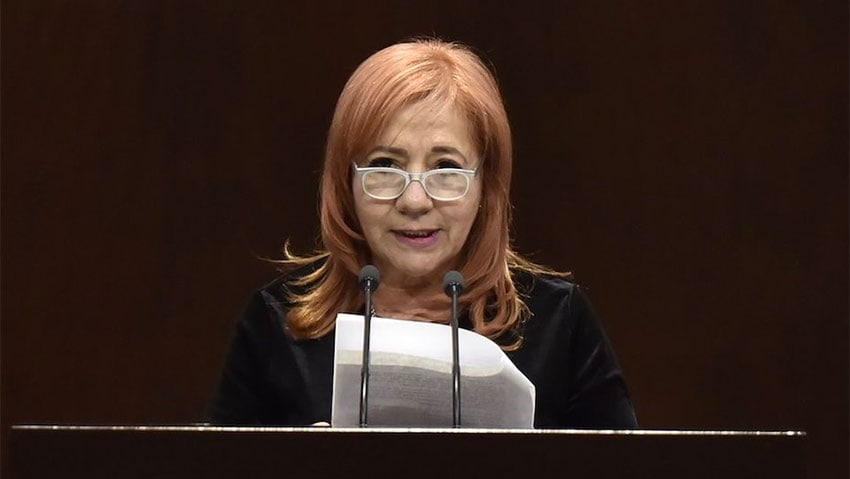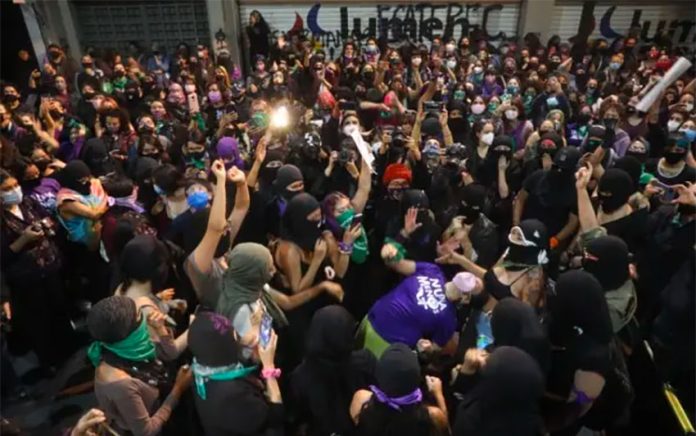Feminist activists who continue to occupy the Mexico City headquarters of the National Human Rights Commission (CNDH) after seizing the premises earlier this month held a boisterous event on Monday at which they burned a piñata of President López Obrador.
The so-called antigrita or anti-cry event was held outside the CNDH headquarters a day before Independence Day celebrations kick off with the commemorative Grito de Dolores (Cry of Dolores), a reenactment of the original shout for independence by Catholic priest Miguel Hidalgo in 1810.
“The country does not represent us,” women shouted late Monday night after denouncing gender violence and calling for justice with their anti-cry.
The event, which also featured live music, dancing and cultural activities, came 10 days after the CNDH headquarters in the historic center of Mexico City was taken over by a feminist collective and turned into a shelter for victims of gender-based violence.
According to the newspaper La Jornada, about 300 women attended Monday’s event, which began in the late afternoon and concluded after the antigrita at 11:00 p.m.
“We’re bad, we can be worse, … whoever doesn’t like it can get screwed,” the activists chanted.
Photographs published on social media and news websites showed a stocky piñata of López Obrador with a bulbous head being burned as hundreds of activists looked on and cheered. A painting of Miguel Hidalgo that was removed from the CNDH premises was also destroyed.
“This is a fucking painting, it’s not worth more than a life,” said Bertha Nava, whose son was one of 43 students who was abducted and presumably killed in Guerrero in September 2014. Nava claimed last week that the president appeared more concerned about damage to the painting than the cause for which the women were protesting.
Other family members of people who have disappeared in Guerrero were also in attendance at Monday’s event.
“We’re fed up, tired of the government and the authorities mocking our pain. My father disappeared two years ago, they don’t understand our pain,” a woman identified only as Flavia told the newspaper El Universal.
Prior to the event, the CNDH issued a statement that said that it has sought dialogue with the activists with a view to retaking possession of its premises.

The rights commission offered to issue a recommendation that the activists not be prosecuted for their actions and said it was prepared to allow them to use another building as a base to carry out their activities in defense of women’s rights and against gender violence.
Meanwhile, CNDH president Rosario Piedra said Monday that she was also a victim, explaining that she suffered human rights violations that were never resolved, referring to abuse against family members in the 1970s.
Piedra, who is currently facing calls for her to resign from feminist activists, some federal lawmakers and others, said the CNDH is facing “a formidable media campaign of smear and lies.”
Speaking during a virtual meeting with members of the Chamber of Deputies’ human rights committee, the rights chief said that the CNDH today is managed with “complete honesty and transparency.”
“They’ve tried to disseminate scandalous and slanderous … [information about the CNDH] but in the end the truth will come out and what will be left are the results,” Piedra said.
She rejected claims that she and other CNDH employees were served gourmet meals at the headquarters now occupied by the activists. Meat found at the premises that was denounced on social media as “cortes finos” or fine cuts was nothing of the sort, Piedra said.
“The menu was like that in any middle-class home: pasta soup, rice, beans, stews, agua fresca [water flavored with fruit], no gourmet food. [The meat] presented as ‘fine cuts’ was beefsteak, pork and beef shank. What I ate was exactly the same as what the cleaning and security staff ate,” she said.
Addressing criticism that she is too close to López Obrador and unduly influenced by him, Piedra responded:
“I exercise my powers fully as head of the commission, removed from pressure and influence other than those of the victims [of human rights violations]. I have done that and I will do that … with a multidisciplinary team in which each person fulfills his or her role and responsibility without overstepping the mark nor subjugating others to ensure teamwork that is efficient and empathetic with the victims. The autonomy of the commission is guaranteed.”
Piedra was appointed human rights chief last November amid claims that she would be a puppet of the federal government. Upon being sworn in she immediately courted more controversy by indicating that she was unaware that any journalists had been killed since López Obrador took office in December 2018 when in fact at least 13 had been murdered.
Source: El Universal (sp), La Jornada (sp)
